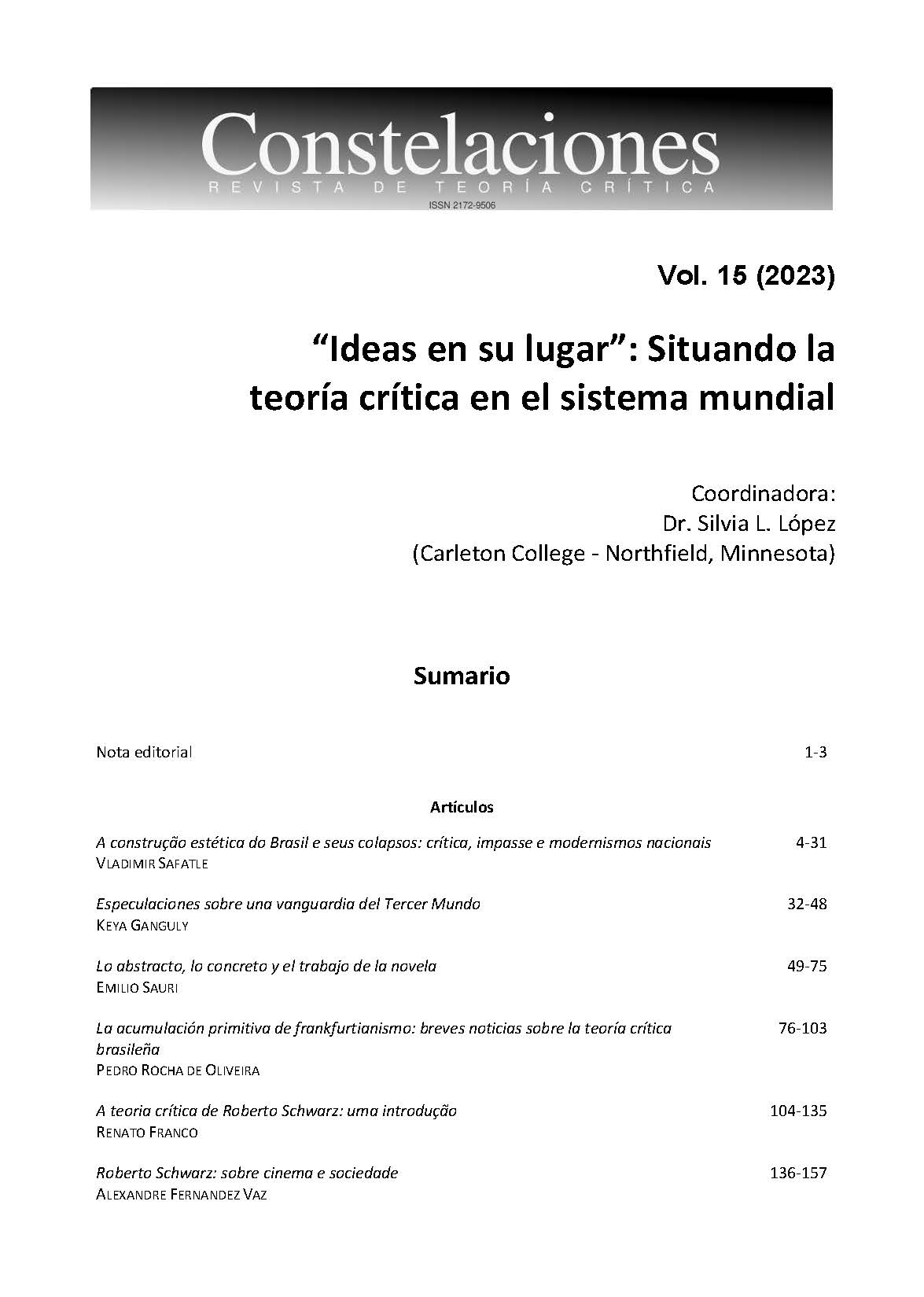Structural Indifference and Seigneurial Democracy: Gabriel Cohn’s Critical Theory
Keywords:
structural indifference, seigneurial democracy, contemporary capitalism, critical theory, Gabriel CohnAbstract
This article discusses the critical theory developed by Brazilian sociologist Gabriel Cohn in the last two decades, based on his concepts of structural indifference and seigneurial democracy. Structural indifference signifies selective operations carried out by complex systems that define what or who is or is not relevant in contemporary capitalism at a global scale. Seigneurial democracy, in turn, refers to the possessive, predatory and punitive nature of orientations of perception and behavior in Brazilian society. This article reconstructs these two notions using different texts by the author. In so doing, it also seeks to highlight the dialogues established by Cohn with the first generation of Frankfurt critical theory – particularly with Theodor Adorno – as well as with Florestan Fernandes, the founder of Brazilian critical sociology. Cross-cutting these two sets of discussions, still in dialogue with Adorno and Fernandes, Cohn proposes an approach for how to assess the past in critical sociology.
Downloads
References
ADORNO, Theodor W. (1984): Dialéctica negativa [1966], Madrid: Taurus.
BRITO, Leonardo Octavio Belinelli de (2020): “Gabriel Cohn e a Escola Paulista de Sociologia”, Sociologia e Antropologia, nº 10, vol. 2, pp. 467-492.
COHN, Gabriel (1979): Crítica e resignação: fundamentos da sociologia de Max Weber, São Paulo: T. A. Queiroz.
COHN, Gabriel (1999): “Florestan Fernandes: a revolução burguesa no Brasil”, en Lourenço Dantas Mota (comp.): Introdução ao Brasil: um banquete no trópico, vol. 1, São Paulo: Editora Senac: 393-412.
COHN, Gabriel (2005): “Florestan Fernandes e o radicalismo plebeu em Sociologia”, Estudos Avançados, nº 19, vol. 55: 245-250.
COHN, Gabriel (2020): “Weber, Adorno e o curso do mundo”, Sociologia e Antropologia, nº 10, vol. 2: 395-422.
COHN, Gabriel (2023a): “Civilização, cidadania e barbárie” [2002]. En: Gabriel Cohn: A difícil república, Rio de Janeiro: Azougue Editorial: 9-31.
COHN, Gabriel (2023b): “A sociologia e o novo padrão civilizatório” [2003]. En: Gabriel Cohn: A difícil república, Rio de Janeiro: Azougue Editorial: 33-49.
COHN, Gabriel (2023c): “Desenvolvimento como processo civilizador” [2016]. En: Gabriel Cohn: A difícil república, Rio de Janeiro, Azougue Editorial: 51-82.
COHN, Gabriel (2023d): “A difícil república” [2020]. En: Gabriel Cohn: A difícil república, Rio de Janeiro: Azougue Editorial: 83-113.
COHN, Gabriel (2023e): “O fascismo latente” [2022]. En: Gabriel Cohn: A difícil república, Rio de Janeiro: Azougue Editorial: 115-128.
COHN, Gabriel (2023f): “Florestan Fernandes e o estilo democrático de vida”. En: Gabriel Cohn: A difícil república, Rio de Janeiro: Azougue Editorial: 131-138.
COHN, Gabriel (2023g): “Apresentação”. En: Gabriel Cohn: A difícil república, Rio de Janeiro: Azougue Editorial: 5-6.
DOMINGUES, José Maurício (2011): “Dominação e indiferença na teoria crítica de Gabriel Cohn”, DADOS: Revista de Ciências Sociais, nº 54, vol. 3: 429-448.
FERNANDES, Florestan (1972): Fundamentos empíricos da explicação sociológica [1959], São Paulo: Companhia Editora Nacional.
FERNANDES, Florestan (2006): A revolução burguesa no Brasil: ensaio de interpretação sociológica [1974], São Paulo: Globo.
FERNANDES, Florestan (2008): Sociedade de classes e subdesenvolvimento [1968], São Paulo: Global.
HORKHEIMER, Max y ADORNO, Theodor W. (1998): Dialéctica de la ilustración: fragmentos filosóficos [1944/1947], Madrid: Editorial Trotta.
KURZ, Robert. Unrentable Menschen: ein Essay über den Zusammenhang von Modernisierungsgeschichte, Krise und neoliberalem Sozialdarwinismus [2005]. EXIT – Krise und Kritik der Warengesellschaft, 19 de enero de 2006. Disponible en: https://www.exit-online.org/druck.php?tabelle=autoren&posnr=237
MUSSE, Ricardo y KLEIN, Stefan (2018): “Um olhar sobre a teoria crítica no Brasil: entrevista com Gabriel Cohn”, Tempo Social, nº 30, vol. 3: 289-300.
PANIZ, Flávia Xavier Merlotti (2016): Gabriel Cohn e o sentido de pensar teoria “entre nós”. Tesis de maestría en Sociología. Campinas: Instituto de Filosofia e Ciências Humanas, Universidade Estadual de Campinas.
PESSANHA, Elina (2020): “Tempo, movimento e teoria social: Gabriel Cohn, um voo solo a partir de São Paulo”, Sociologia e Antropologia, nº 10, vol. 2: 377-391.
STREECK, Wolfgang (2017): “¿Cómo terminará el capitalismo?” [2014]. En: Wolfgang Streeck, ¿Cómo terminará el capitalismo? Ensayos sobre un sistema en decadencia [2016], Madrid: Traficantes de Sueños: 67-95.
Downloads
Published
How to Cite
Issue
Section
License
Copyright (c) 2023 Ricardo Pagliuso

This work is licensed under a Creative Commons Attribution-NonCommercial-ShareAlike 4.0 International License.
Authors who have publications with this journal accept the following terms:
1. Authors will retain their copyright and grant the journal the right of first publication of their work, which will be simultaneously subject to the License of recognition of Creative Commons CC BY-NC-SA 4.0 that allows third parties to share, redistribute and adapt the work provided it is for non-commercial purposes and its author and first publication in this journal is indicated.
2. Authors may adopt other non-exclusive distribution license agreements for the version of the published work (e.g., depositing it in an institutional electronic archive or publishing it in a monographic volume) provided that the initial publication in this journal is indicated.
3. Authors are permitted and encouraged to disseminate their work via the Internet (e.g., in institutional telematic archives or on their website) before and during the submission process, which can produce interesting exchanges and increase citations of the published work. (See The Effect of Open Access).
Data confidentiality
1. Constelaciones. Revista de Teoría Crítica guarantees that the data you send us will only be used to meet the requests made in this message.
2. Your data will not be passed on to third parties.
3. You may request that your data be removed from our records at any time.





